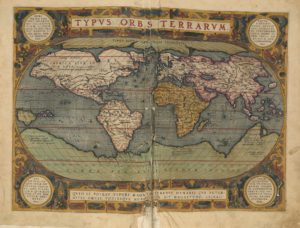The Southern Strategies of Early Modern Empires (circa 1444–1800)
Project Directors: Ben Ehlers (History), Elizabeth Wright (Romance Languages)
This Andrew W. Mellon Foundation grant-funded project is part of the Global Studies of the American South research category in the Willson Center’s expanded Global Georgia Initiative.
The Early Modern Studies Group brings together faculty and graduate students from the departments of English, History, Romance Languages, and Theatre and Film with the goal of examining the “southern strategies” of empire builders (ca. 1444 – ca. 1800). Together, they are examining and debating the momentous changes that engendered the American South—the emergent Atlantic slave trade, cultural exchanges between Europeans and Amerindians, wars of conquest, and movements resisting imperial domination. The group invites prominent scholars of early modernity to lecture at UGA, organizes workshops to debate methodologies, and mentors graduate students who are developing their own research topics in this area.
Our framework of empires’ southern strategies engages a range of scholarly works that transcend the traditional organization of disciplines along the lines of modern nation-states and their official languages. We come together recognizing that scholars of the humanities have made great strides in transcending national and linguistic boundaries of traditional academic departments to examine an Atlantic world that was always, already a global south, with such works as Paul Gilroy’s classic Black Atlantic (1993) leading the way. But our activities are inspired by our shared realization that much work remains to be done to adapt courses and fields of academic study to reflect the global interconnections and entanglements that made the American South. Members of our research cluster are: Frances Teague, from Theater and Film studies; Sujata Iyengar, Jason Payton, and Miriam Jacobson from English; Benjamin Ehlers, from History; plus Dana Bultman, Alberto Villate, Richard Gordon, Jonathan Haddad, Paola DeSanto, and Elizabeth Wright, from Romance Languages.
Image credit:
World Map, in Abraham Ortelius, Theatro d’el Orbe de la tierra (1570). From the Spanish translation: Antwerp, Plantin Press, 1602. Biblioteca Histórica de la Universidad Complutense de Madrid. BH Fil. Res. 10.
